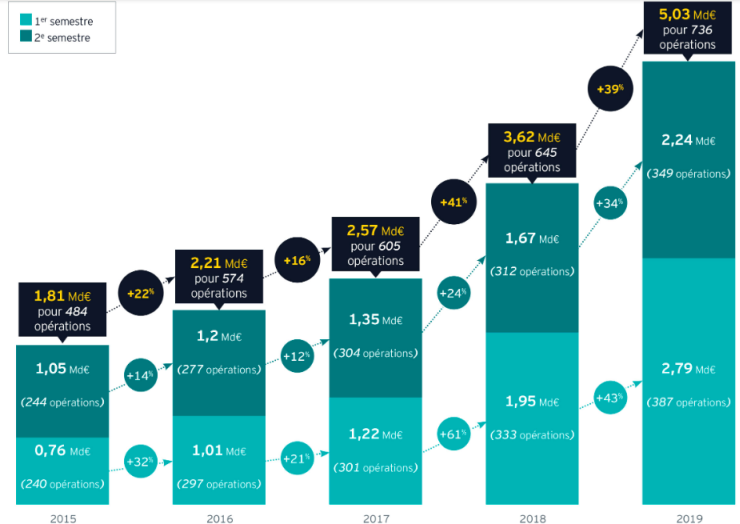In 2019, 736 French startups raised over $5 billion in venture capital financing, a new record.

This figure compares favorably to Germany ($3.5 billion raised in VC) and the UK (about $8 billion). The full study from EY can be found here.
Notably, France’s top five on this list include Ynsect, an innovative insect-based animal nutrition startup that took Japan by storm during the Nikkei’s AG/SUM conference a couple years back.
I still recall with nostalgia the dark days of 2001, when France’s startup ecosystem was still in its infancy. Sure, a certain exuberance emerged during the preceding dot-com boom, which generated some interest for technology entrepreneurship in France. Yet none of the projects from that era really broke through. Today’s dominance of France’s startup community found its roots in the dot-com bust and really came into its own thanks to the contributions of a variety of stakeholders over the past 15 years.
France’s trajectory represents a relevant model for other geographies seeking to to grow their own domestic innovation ecosystems.
I am asked the question a lot in Japan about how a region or local municipality can create their own little version of Silicon Valley. My answer is almost always inevitably that Silicon Valley is probably not the right model to emulate (and I’d like to think that I speak with some credibility on the topic as I was born and raised in Silicon Valley myself).
Rather, more relevant ecosystems to emulate are often found outside of Silicon Valley. In my opinion, for example, Tokyo should look at what Paris has done over the past 15 years, becoming a magnet capital city for digital startups of myriad sectors. Or for example, perhaps a city like Nagoya should look at Lillle, which has built a vibrant environment of technology innovation around the industrial corridor in northern France. Perhaps Fukuoka should look toward Montpellier, etc.
My rationale for this is that the cultural and regulatory contexts of these hubs resembles more closely the context in these Japanese cities, respectively. In terms of educational systems, historical cultural norms, the social pact between employers and employees, and the regulatory environment, Japan operates within a context more similar to France than that of Silicon Valley.
It really was not that long ago that top graduates from France’s elite universities felt pressure from their families and society overall to join the workforce of large, established companies. Stability was prized in careers, and lifetime employment was not uncommon. The only people who created businesses were those who could not find a job elsewhere, or perhaps immigrants who were perceived as unemployable.
Not even two decades later, the environment is radically different. Traditional, established companies across almost all sectors are facing technology disruption. They need to embrace digital transformation in order to survive. The belief that large companies offer stable and fulfilling career paths has been replaced by the acknowledgement that stability and fulfillment are more likely to come from innovative companies, not necessarily large ones, and certainly not from traditional corporates who cannot figure out how to adapt.
Moreover, at the social level, launching a startup in France is now lauded as a legitimate career choice, regardless of one’s pedigree. Failure is no longer stigmatized.
With the caveat that VC fundraising magnitude does not automatically translate into guaranteed success of a given startup, on the aggregate level, this new record in capital raising for France demonstrates an ecosystem which has surmounted its historic hurdles in less than two economic cycles.
So it can be done. Japan should take note.

フランスのスタートアップ投資額が過去最高を更新——日本のエコシステム形成にも応用できるフランスの類似点とは?【ゲスト寄稿】 - BRIDGE(ブリッジ) wrote:
[…] guest post is first appeared on Mark Bivens’ Blog. Mark is a Paris- / Tokyo-based venture […]
Link | September 24th, 2020 at 14:06